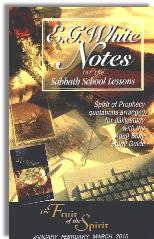|
||||||||||||||
Commentary on "The Fruit of the Spirit is Meekness"
Day 1: Sabbath Afternoon, February 20, 2010
OVERVIEW
The author discusses how meekness seems lost in our aggressive, self-centered culture. People associate meekness with weakness, consequently creating a negative connotation. He defines meekness as “an attitude of humility toward God and gentleness toward people”, and that to be meek, one needs confidence in the Lord, not in oneself. He ends with the statement “Thus, meekness arises out of strength, not weakness”.
OBSERVATIONS
The author’s premise if good, but I would like to go a bit further. Though the essence may be the idea of being mild, the larger concept is being able to find the middle ground between overreacting in a situation and not reacting at all. Meekness is really about responding rightly. It’s choosing not to react, but rather respond according to the truths and principles of God’s Word to people and life’s situations/circumstances. It takes far more strength and power to control oneself so as to respond rightly than it does to just “fly off the handle”. Thus in calling us to be meek, Jesus is instructing us to take the power we have to react to people or situations and put it under HIS control so as to respond as He would in any given situation. It’s power under control. Therefore, the author’s last statement that meekness arises out of strength, not weakness, is correct, but it’s about God’s strength, not ours. It’s not about attitude—it’s about self-control empowered by the Holy Spirit, who indwells each one of us as believers. Galatians 5:16-18 says,
“I say then, walk by the Spirit and you will not carry out the desire of the flesh. For the flesh desires what is against the Spirit, and the Spirit desires what is against the flesh; these are opposed to each other, so that you don’t do what you want. But if you are led by the Spirit, you are not under the law.”
It’s about God’s power working in me and responding rightly based on a right view of God’s Word and who I am in Christ. If we are in Christ, we are a new creation. The Fruit of the Spirit will be evident, and we will look different because of HIS work in us:
“Therefore, if anyone is in Christ, there is a new creation; old things have passed away, and look, new things have come.” (2 Cor. 5:17)
SUMMARY
- Meekness is not really an attitude, but a response based on God’s Word and a right view of who I am in Christ. It’s based on something concrete (God’s Word and the power of the Holy Spirit in me) instead of my human emotional response.
- Meekness is finding the middle ground between overreacting and not reacting. It’s about responding rightly according to God’s Word and principles.
- The author’s statement that “Meekness arises out of strength, not weakness” is correct, however, it needs to be emphasized that this power is not of our own will, but the strength of the Holy Spirit in us (Gal. 5:16-18). If we are in Christ, we are a new creation (2 Cor. 5:17).
GO TO DAY 2
Copyright 2010 BibleStudiesForAdventists.com. All rights reserved. Revised February 22, 2010. This website is published by Life Assurance Ministries, Glendale, Arizona, USA, the publisher of Proclamation! Magazine. Contact email: BibleStudiesForAdventists@gmail.com.
The Sabbath School Bible Study Guide and the corresponding E.G. White Notes are published by Pacific Press Publishing Association, which is owned and operated by the Seventh-day Adventist church. The current quarter's editions are pictured above.
Official Adventist Resources
Standard Edition Study Guide Week 9
Teacher's Edition Study Guide Week 9
Easy Reading Edition Study Guide Week 9
Search the Complete Published Ellen G. White Writings


